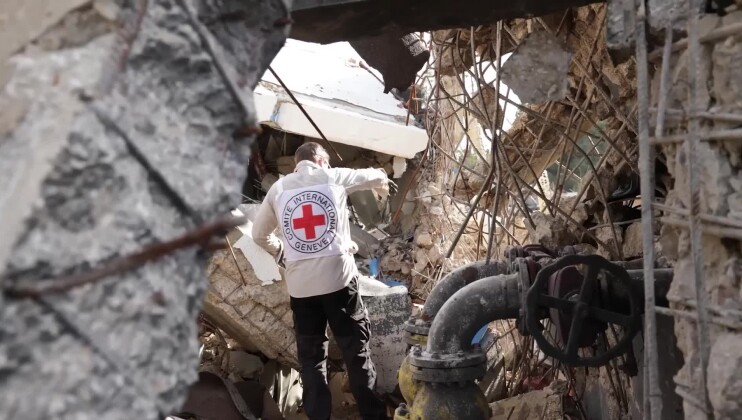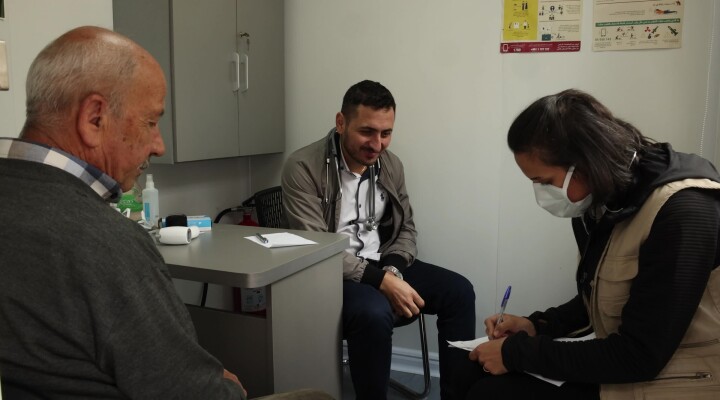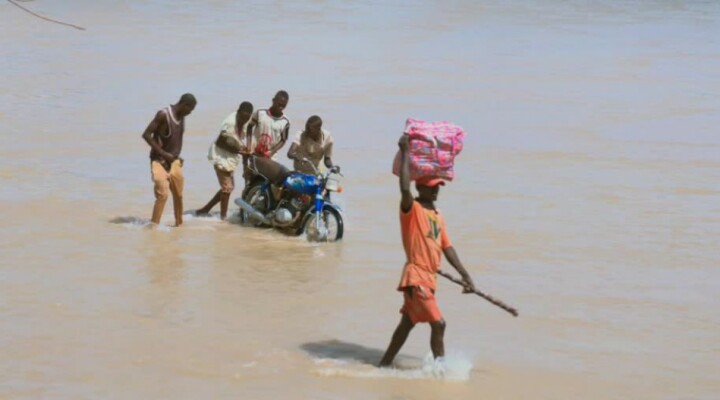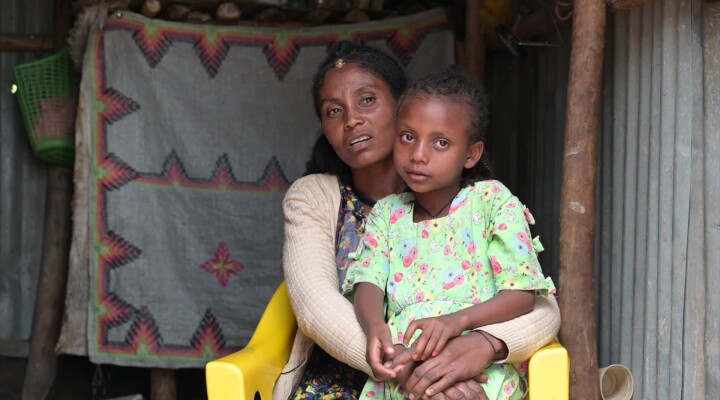Helping The Displaced In Bangladesh As Covid-19 Looms
Hundreds of thousands of people, displaced by violence in Myanmar, live in crowded refugee camps in Bangladesh. It is a precarious existence at the best of times; when so many people live so close together, disease can spread easily. Now, with Covid-19, there is a new, and potentially deadly threat.
Konarpara camp, on the Bangladesh/Myanmar border, is a no man’s land housing 620 displaced families from Rakhine state. They have already fled their homes, their living conditions are precarious, up to ten people in makeshift plastic shelters, sharing toilets. Now the monsoon season is approaching.
The tried and tested ways to control the spread of Covid-19, physical distancing, and hygiene, are difficult to achieve in this environment. But the ICRC, the only international aid agency with access to Konarpara, is already working on it.
A new strategy for food distribution, designed to ensure everyone gets what they need, but no one gets too close, is underway.
“We have split the distribution dates,” explains ICRC delegate Berthe Diomande. “Before we were distributing to 600 people all in one day.”
“Now we have three days of distribution to avoid gathering too many people at the same time. And they will come and stand in line according to social distancing. We already marked the places where they should stand to maintain social distancing.”
The ICRC, together with the Bangladesh Red Crescent, is also helping the families in Konarpara to maintain good hand hygiene, with special hand washing lessons even for the youngest. Before getting food, everyone washes their hands.
Access to health services is more important than ever. The ICRC’s mobile health clinic visits Kornarpara twice a week, to check for Covid-19 symptoms, and, as ever, to provide basic health care. Anwara Begam knows the clinic well, and went straight there when her son became ill.
“My baby has a cough,” she says. “He’s had a cold, and been coughing all night for a few days now.”
“Whenever we are ill we come here,” she continues. “We come and wait for the doctor. We don’t go anywhere else for treatment.”
The medical team have been operating right from the moment the displaced arrived from Myanmar, and have tackled vector borne diseases like dengue, and fast bacterial infection such as cholera and diphtheria.
“Health care is a basic need, and fundamental to everyone,” says Dr Dishad Chandra Sarker. “Children under 5 are especially vulnerable. They come here with diarrhea or asthma, and if we don’t treat them they could die.”
But working within the context of Covid-19 presents special challenges, especially given the living conditions in Konarpara camp, and the limited health infrastructure across Bangladesh.
“The whole world is facing a shortage of PPE (personal protective equipment),” explains Dr Sarker. “We are trying to get it as well. It is our job to treat everyone who needs health care, we are doing that, but we should not have to make compromises about PPE.”
So far, no case of Covid-19 has been reported in Konarpara. Hopefully, with the new hygiene and distancing strategies, and the vigilance of the medical team, it will stay that way.
KEY FACTS
- The ICRC is providing soap and clean water to Konarpara camp, and has stepped up hygiene lessons.
- Regular food distribution has been reorganized to ensure social distancing.
- A mobile medical clinic, equipped to detect cases of Covid-19, visits twice a week.
For further information please contact:
Pawel Krzysiek, ICRC spokesperson in Asia-Pacific, pkrzysiek@icrc.org +66819501270
SHOTLIST
Filming date 2018, April 2020
Locations Cox’s Bazaar (in 2018) and Konarpara (April 2020) Bangladesh
Language English, Bengal
ICRC producer Various
Cameraman Various
| Time code | LOCATION / IMAGE / TRANSCRIPTS |
| 0:00 – 0:30 | Various clips showing the crowded Cox’s Bazaar refugee camp. These clips are from 2018. |
| 0:30 – 0:44 | Wide shots of Konarpara camp and a man carrying supplies. |
| 0:44 – 0:55 | Masked refugees washing their hands. |
| 0:55 – 1:01 | Food distribution at Konarpara camp. |
| 1:01 – 1:11 | Man drawing social distancing markers. |
| 1:11 – 1:17 | Refugees standing in line. |
| 1:17 – 1:46 | Soundbite ICRC delegate Berthe Diomande: “We have split the distribution dates. Before we were distributing to 600 people all in one day. Now we have three days of distribution to avoid gathering too many people at the same time. And they will come and stand in line according to social distancing. We already marked the places where they should stand to maintain social distancing.” |
| 1:46 – 2:11 | Two clips of refugee kids being shown proper hand disinfection. |
| 2:11 – 2:33 | Clips of the mobile medical centre in Konarpara |
| 2:33 – 2:50 | Soundbite Refugee Anwara Begam: “My baby has a cough. He’s had a cold and been coughing all night for a few days now. Whenever we are ill, we come here. We come and wait for the doctor. We don’t go anywhere else for treatment.” |
| 2:50 – 3:00 | More queues of refugees practicing social distancing. |
| 3:00 – 3:36 | Three clips of the medical staff in their makeshift practice treating and consulting patients/refugees. |
| 3:36 – 4:23 | Soundbite Dr Dishad Chandra Sarker “Health care is a basic need, and fundamental to everyone. Children under 5 are especially vulnerable. They come here with diarrhea or asthma, and if we don’t treat them they could die. The whole world is facing a shortage of PPE (personal protective equipment. We are trying to get it as well. It is our job to treat everyone who needs health care, we are doing that, but we should not have to make compromises about PPE.” |
| 4:23 – 4:32 | Families waiting outside the mobile medical centre. |
| 4:32 – 4:49 | Refugees being shown an instructional video, by ICRC staff, about how to protect oneself from Covid-19. |



